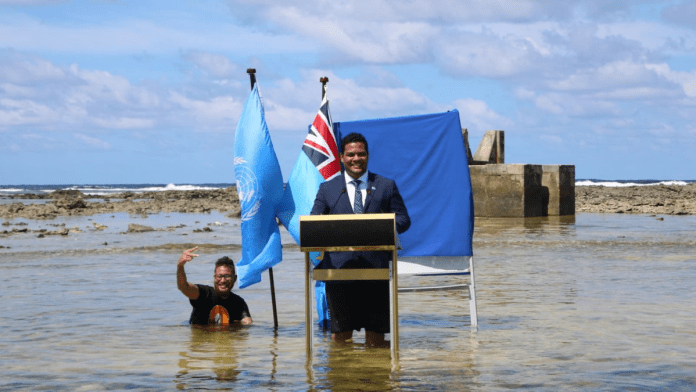🕒 Last updated on September 28, 2025
Climate change is no longer a distant threat; it is already flooding homes, drying farmlands, and swallowing coastlines. Leaders from across the world issued a clear warning: the planet is in danger, and action cannot wait. From rainforests to deserts and sinking islands, the message was the same. Rising temperatures and pollution are damaging lives, nature, and economies. Countries are battling to survive, not for sympathy, but for real support through clean energy, fair funding, and global unity.
Nature under attack
In many parts of the world, nature is breaking under pressure. Forests that once stood tall are being cut down or burning away in wildfires. Rivers are drying up before reaching farmlands. Coral reefs, home to colorful fish and sea life, are turning pale and dying.
Some countries still have large areas of untouched forests and oceans, and they are working hard to protect them. They are planting trees, guarding wetlands, and creating special zones where wildlife can live safely. These countries say that protecting nature is not just good for animals. It is also the cheapest shield against climate disasters. Trees slow floods. Mangroves stop waves from damaging coasts. Healthy soil keeps farms alive even in hot weather.
But protecting nature costs money. Tools, training, and monitoring are needed. Many of these nations are already doing their best, even though they did very little to cause global warming in the first place. They want the world to treat nature as a treasure, not a resource to be used and forgotten.
Islands on the edge
The loudest voices came from small island countries. They are surrounded by rising seas that creep closer every year. Some villages have already been forced to move inland. In a few places, fresh water is turning salty because seawater is seeping into wells. Schools and hospitals need stronger walls so they do not collapse during powerful storms.
These islands say that words and promises are not enough. They need real action and real funding. Plans on paper do not stop the tides. Speeches do not build seawalls. They need help installing strong barriers, planting mangroves, and creating higher ground for people to live on. They warned that if the world does not act fast, entire cultures may disappear under the ocean.
Many of these nations are also switching to solar and wind power. Some have even become “carbon-negative,” which means they absorb more pollution than they release. But they say they cannot keep going alone. They are asking for easier access to climate funds, without long delays or confusing paperwork.
Hope through clean energy
Even in the middle of danger, many leaders showed hope. They believe that switching from dirty fuels to clean energy can create new jobs, healthier cities, and safer futures. Solar panels, wind turbines, and water-based power are now cheaper in many places than coal or oil. Some countries are aiming to triple the amount of renewable energy they produce. Others are improving energy efficiency so that less power is wasted.
Sinking islands, vanishing forests: World leaders call for urgent climate action
These countries say that fighting climate change is not just about cutting emissions. It is about improving lives. Cleaner air means fewer sick people. Better buildings mean safer homes. Smart farming methods protect crops from drought and floods. Using new technology can also support education, water supply, and transportation.
However, they stressed that clean energy cannot grow fast enough without proper support. Big companies and wealthy nations must invest more in green solutions. They must also share technology so that poorer nations do not fall behind.
Climate change is not just a problem for one region. It is happening everywhere—on high mountains, farmlands, coastlines, and deep forests. The leaders who spoke made it clear: the tools to fix the problem already exist. What is missing is speed, cooperation, and fairness.
Their voices carried both warning and hope. The world has a choice—act now or risk losing what cannot be replaced.

